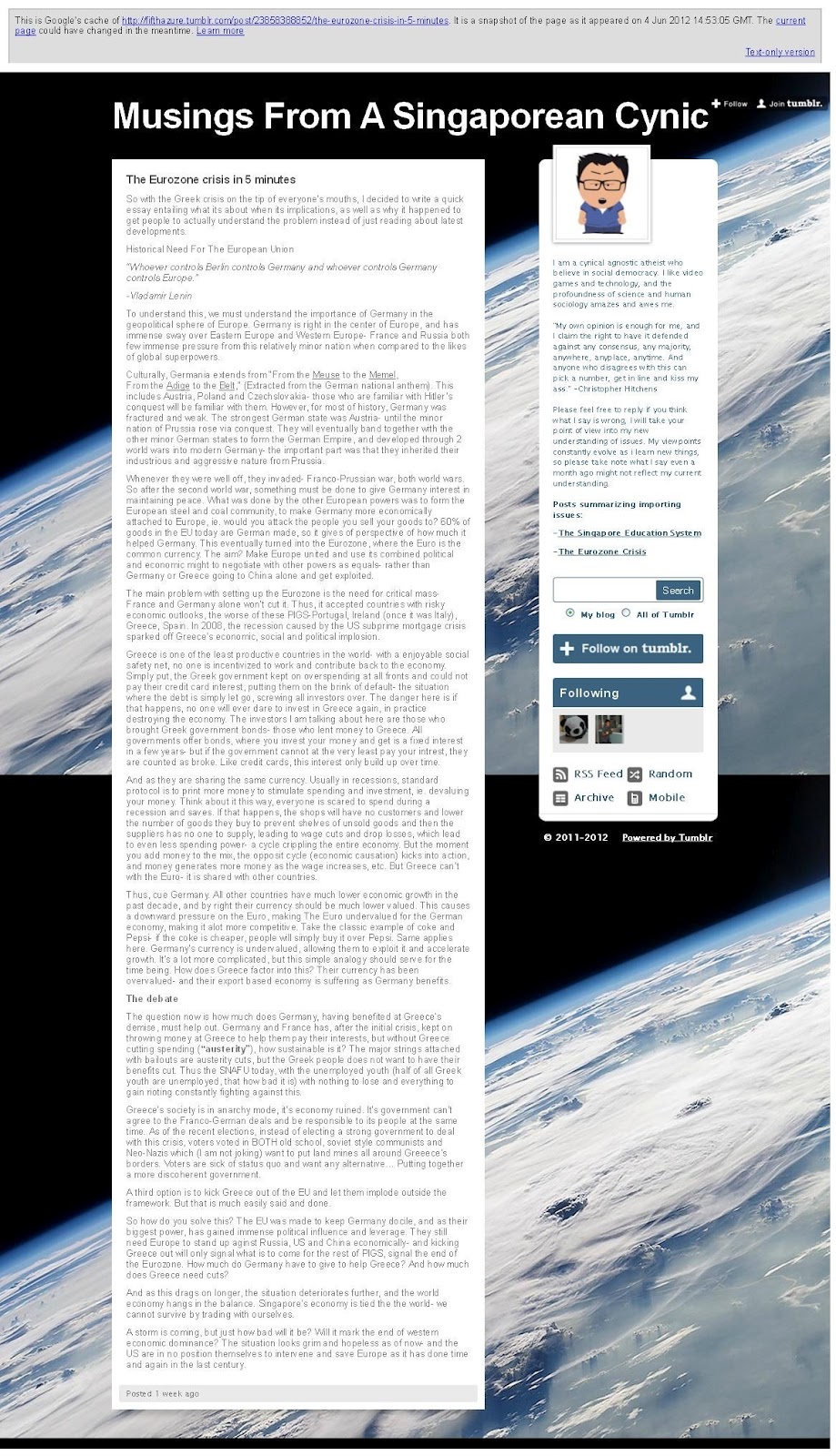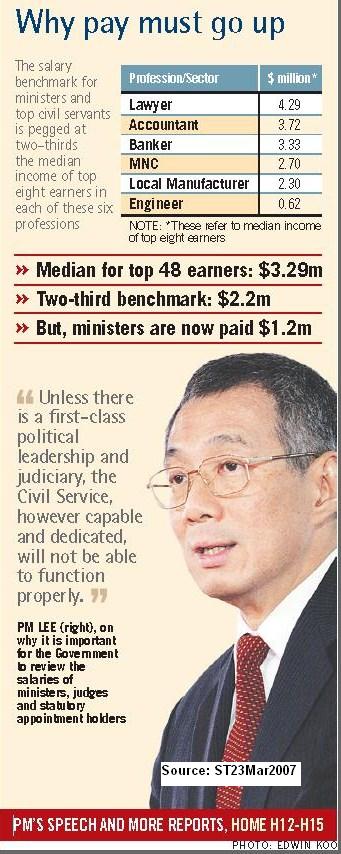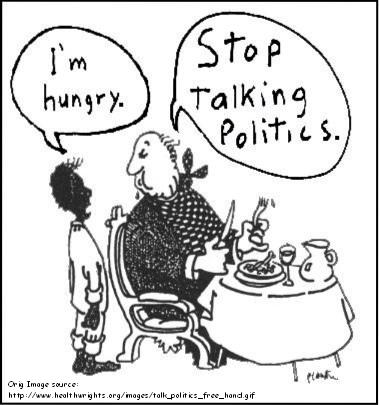- Joined
- Jan 5, 2010
- Messages
- 2,107
- Points
- 83
The Eurozone crisis in 5 minutes: By A Singaporean Cynic, dated approx late May2012
The following is a salvaged cache version (previously posted at personal [blog] but now unavailable, see reasons @ bottom).
So with the Greek crisis on the tip of everyone’s mouths, I decided to write a quick essay entailing what its about when its implications, as well as why it happened to get people to actually understand the problem instead of just reading about latest developments.
Historical Need For The European Union
“Whoever controls Berlin controls Germany and whoever controls Germany controls Europe.”
-Vladamir Lenin
To understand this, we must understand the importance of Germany in the geopolitical sphere of Europe. Germany is right in the center of Europe, and has immense sway over Eastern Europe and Western Europe- France and Russia both few immense pressure from this relatively minor nation when compared to the likes of global superpowers.
Culturally, Germania extends from “From the Meuse to the Memel,
From the Adige to the Belt,” (Extracted from the German national anthem). This includes Austria, Poland and Czechslovakia- those who are familiar with Hitler’s conquest will be familiar with them. However, for most of history, Germany was fractured and weak. The strongest German state was Austria- until the minor nation of Prussia rose via conquest. They will eventually band together with the other minor German states to form the German Empire, and developed through 2 world wars into modern Germany- the important part was that they inherited their industrious and aggressive nature from Prussia.
Whenever they were well off, they invaded- Franco-Prussian war, both world wars. So after the second world war, something must be done to give Germany interest in maintaining peace. What was done by the other European powers was to form the European steel and coal community, to make Germany more economically attached to Europe, ie. would you attack the people you sell your goods to? 60% of goods in the EU today are German made, so it gives of perspective of how much it helped Germany. This eventually turned into the Eurozone, where the Euro is the common currency. The aim? Make Europe united and use its combined political and economic might to negotiate with other powers as equals- rather than Germany or Greece going to China alone and get exploited.
The main problem with setting up the Eurozone is the need for critical mass- France and Germany alone won’t cut it. Thus, it accepted countries with risky economic outlooks, the worse of these PIGS-Portugal, Ireland (once it was Italy), Greece, Spain. In 2008, the recession caused by the US subprime mortgage crisis sparked off Greece’s economic, social and political implosion.
Greece is one of the least productive countries in the world- with a enjoyable social safety net, no one is incentivized to work and contribute back to the economy. Simply put, the Greek government kept on overspending at all fronts and could not pay their credit card interest, putting them on the brink of default- the situation where the debt is simply let go, screwing all investors over. The danger here is if that happens, no one will ever dare to invest in Greece again, in practice destroying the economy. The investors I am talking about here are those who brought Greek government bonds- those who lent money to Greece. All governments offer bonds, where you invest your money and get is a fixed interest in a few years- but if the government cannot at the very least pay your intrest, they are counted as broke. Like credit cards, this interest only build up over time.
And as they are sharing the same currency. Usually in recessions, standard protocol is to print more money to stimulate spending and investment, ie. devaluing your money. Think about it this way, everyone is scared to spend during a recession and saves. If that happens, the shops will have no customers and lower the number of goods they buy to prevent shelves of unsold goods and then the suppliers has no one to supply, leading to wage cuts and drop losses, which lead to even less spending power- a cycle crippling the entire economy. But the moment you add money to the mix, the opposit cycle (economic causation) kicks into action, and money generates more money as the wage increases, etc. But Greece can’t with the Euro- it is shared with other countries.
Thus, cue Germany. All other countries have much lower economic growth in the past decade, and by right their currency should be much lower valued. This causes a downward pressure on the Euro, making The Euro undervalued for the German economy, making it alot more competitive. Take the classic example of coke and Pepsi- if the coke is cheaper, people will simply buy it over Pepsi. Same applies here. Germany’s currency is undervalued, allowing them to exploit it and accelerate growth. It’s a lot more complicated, but this simple analogy should serve for the time being. How does Greece factor into this? Their currency has been overvalued- and their export based economy is suffering as Germany benefits.
The debate
The question now is how much does Germany, having benefited at Greece’s demise, must help out. Germany and France has, after the initial crisis, kept on throwing money at Greece to help them pay their interests, but without Greece cutting spending (“austerity”), how sustainable is it? The major strings attached with bailouts are austerity cuts, but the Greek people does not want to have their benefits cut. Thus the SNAFU today, with the unemployed youth (half of all Greek youth are unemployed, that how bad it is) with nothing to lose and everything to gain rioting constantly fighting against this.
Greece’s society is in anarchy mode, it’s economy ruined. It’s government can’t agree to the Franco-German deals and be responsible to its people at the same time. As of the recent elections, instead of electing a strong government to deal with this crisis, voters voted in BOTH old school, soviet style communists and Neo-Nazis which (I am not joking) want to put land mines all around Greeece’s borders. Voters are sick of status quo and want any alternative… Putting together a more discoherent government.
A third option is to kick Greece out of the EU and let them implode outside the framework. But that is much easily said and done.
So how do you solve this? The EU was made to keep Germany docile, and as their biggest power, has gained immense political influence and leverage. They still need Europe to stand up aginst Russia, US and China economically- and kicking Greece out will only signal what is to come for the rest of PIGS, signal the end of the Eurozone. How much do Germany have to give to help Greece? And how much does Greece need cuts?
And as this drags on longer, the situation deteriorates further, and the world economy hangs in the balance. Singapore’s economy is tied the the world- we cannot survive by trading with ourselves.
A storm is coming, but just how bad will it be? Will it mark the end of western economic dominance? The situation looks grim and hopeless as of now- and the US are in no position themselves to intervene and save Europe as it has done time and again in the last century.

About the author:
I am a cynical agnostic atheist who believe in social democracy. I like video games and technology, and the profoundness of science and human sociology amazes and awes me.
"My own opinion is enough for me, and I claim the right to have it defended against any consensus, any majority, anywhere, anyplace, anytime. And anyone who disagrees with this can pick a number, get in line and kiss my ass." -Christopher Hitchens
Please feel free to reply if you think what I say is wrong, I will take your point of view into my new understanding of issues. My viewpoints constantly evolve as i learn new things, so please take note what I say even a month ago might not reflect my current understanding.
========
PS: The original blog has since been shut down after the author, his parent, an SAJC teacher met up and apologized to Mr Teo CH as reported at 'JC student apologises to DPM Teo for blog post' [A1 News, 08June2012]


 [World Poverty, a look at causes and solutions.]
[World Poverty, a look at causes and solutions.]
 [Source: 'Poverty']
[Source: 'Poverty']
The following is a salvaged cache version (previously posted at personal [blog] but now unavailable, see reasons @ bottom).
So with the Greek crisis on the tip of everyone’s mouths, I decided to write a quick essay entailing what its about when its implications, as well as why it happened to get people to actually understand the problem instead of just reading about latest developments.
Historical Need For The European Union
“Whoever controls Berlin controls Germany and whoever controls Germany controls Europe.”
-Vladamir Lenin
To understand this, we must understand the importance of Germany in the geopolitical sphere of Europe. Germany is right in the center of Europe, and has immense sway over Eastern Europe and Western Europe- France and Russia both few immense pressure from this relatively minor nation when compared to the likes of global superpowers.
Culturally, Germania extends from “From the Meuse to the Memel,
From the Adige to the Belt,” (Extracted from the German national anthem). This includes Austria, Poland and Czechslovakia- those who are familiar with Hitler’s conquest will be familiar with them. However, for most of history, Germany was fractured and weak. The strongest German state was Austria- until the minor nation of Prussia rose via conquest. They will eventually band together with the other minor German states to form the German Empire, and developed through 2 world wars into modern Germany- the important part was that they inherited their industrious and aggressive nature from Prussia.
Whenever they were well off, they invaded- Franco-Prussian war, both world wars. So after the second world war, something must be done to give Germany interest in maintaining peace. What was done by the other European powers was to form the European steel and coal community, to make Germany more economically attached to Europe, ie. would you attack the people you sell your goods to? 60% of goods in the EU today are German made, so it gives of perspective of how much it helped Germany. This eventually turned into the Eurozone, where the Euro is the common currency. The aim? Make Europe united and use its combined political and economic might to negotiate with other powers as equals- rather than Germany or Greece going to China alone and get exploited.
The main problem with setting up the Eurozone is the need for critical mass- France and Germany alone won’t cut it. Thus, it accepted countries with risky economic outlooks, the worse of these PIGS-Portugal, Ireland (once it was Italy), Greece, Spain. In 2008, the recession caused by the US subprime mortgage crisis sparked off Greece’s economic, social and political implosion.
Greece is one of the least productive countries in the world- with a enjoyable social safety net, no one is incentivized to work and contribute back to the economy. Simply put, the Greek government kept on overspending at all fronts and could not pay their credit card interest, putting them on the brink of default- the situation where the debt is simply let go, screwing all investors over. The danger here is if that happens, no one will ever dare to invest in Greece again, in practice destroying the economy. The investors I am talking about here are those who brought Greek government bonds- those who lent money to Greece. All governments offer bonds, where you invest your money and get is a fixed interest in a few years- but if the government cannot at the very least pay your intrest, they are counted as broke. Like credit cards, this interest only build up over time.
And as they are sharing the same currency. Usually in recessions, standard protocol is to print more money to stimulate spending and investment, ie. devaluing your money. Think about it this way, everyone is scared to spend during a recession and saves. If that happens, the shops will have no customers and lower the number of goods they buy to prevent shelves of unsold goods and then the suppliers has no one to supply, leading to wage cuts and drop losses, which lead to even less spending power- a cycle crippling the entire economy. But the moment you add money to the mix, the opposit cycle (economic causation) kicks into action, and money generates more money as the wage increases, etc. But Greece can’t with the Euro- it is shared with other countries.
Thus, cue Germany. All other countries have much lower economic growth in the past decade, and by right their currency should be much lower valued. This causes a downward pressure on the Euro, making The Euro undervalued for the German economy, making it alot more competitive. Take the classic example of coke and Pepsi- if the coke is cheaper, people will simply buy it over Pepsi. Same applies here. Germany’s currency is undervalued, allowing them to exploit it and accelerate growth. It’s a lot more complicated, but this simple analogy should serve for the time being. How does Greece factor into this? Their currency has been overvalued- and their export based economy is suffering as Germany benefits.
The debate
The question now is how much does Germany, having benefited at Greece’s demise, must help out. Germany and France has, after the initial crisis, kept on throwing money at Greece to help them pay their interests, but without Greece cutting spending (“austerity”), how sustainable is it? The major strings attached with bailouts are austerity cuts, but the Greek people does not want to have their benefits cut. Thus the SNAFU today, with the unemployed youth (half of all Greek youth are unemployed, that how bad it is) with nothing to lose and everything to gain rioting constantly fighting against this.
Greece’s society is in anarchy mode, it’s economy ruined. It’s government can’t agree to the Franco-German deals and be responsible to its people at the same time. As of the recent elections, instead of electing a strong government to deal with this crisis, voters voted in BOTH old school, soviet style communists and Neo-Nazis which (I am not joking) want to put land mines all around Greeece’s borders. Voters are sick of status quo and want any alternative… Putting together a more discoherent government.
A third option is to kick Greece out of the EU and let them implode outside the framework. But that is much easily said and done.
So how do you solve this? The EU was made to keep Germany docile, and as their biggest power, has gained immense political influence and leverage. They still need Europe to stand up aginst Russia, US and China economically- and kicking Greece out will only signal what is to come for the rest of PIGS, signal the end of the Eurozone. How much do Germany have to give to help Greece? And how much does Greece need cuts?
And as this drags on longer, the situation deteriorates further, and the world economy hangs in the balance. Singapore’s economy is tied the the world- we cannot survive by trading with ourselves.
A storm is coming, but just how bad will it be? Will it mark the end of western economic dominance? The situation looks grim and hopeless as of now- and the US are in no position themselves to intervene and save Europe as it has done time and again in the last century.
About the author:
I am a cynical agnostic atheist who believe in social democracy. I like video games and technology, and the profoundness of science and human sociology amazes and awes me.
"My own opinion is enough for me, and I claim the right to have it defended against any consensus, any majority, anywhere, anyplace, anytime. And anyone who disagrees with this can pick a number, get in line and kiss my ass." -Christopher Hitchens
Please feel free to reply if you think what I say is wrong, I will take your point of view into my new understanding of issues. My viewpoints constantly evolve as i learn new things, so please take note what I say even a month ago might not reflect my current understanding.
========
PS: The original blog has since been shut down after the author, his parent, an SAJC teacher met up and apologized to Mr Teo CH as reported at 'JC student apologises to DPM Teo for blog post' [A1 News, 08June2012]


Last edited:

